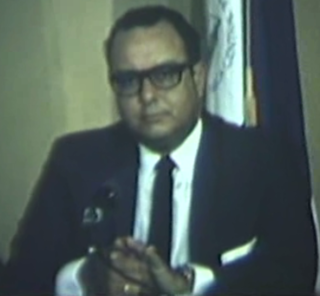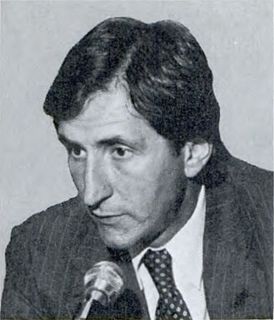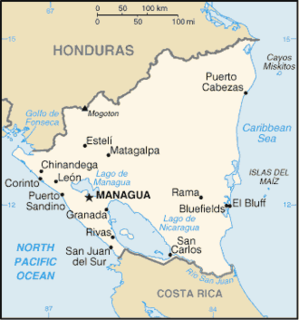Related Research Articles

The Contras were the various U.S.-backed and funded right-wing rebel groups that were active from 1979 to 1990 in opposition to the Marxist Sandinista Junta of National Reconstruction Government in Nicaragua, which came to power in 1979 following the Nicaraguan Revolution. Among the separate contra groups, the Nicaraguan Democratic Force (FDN) emerged as the largest by far. In 1987, virtually all Contra organizations were united, at least nominally, into the Nicaraguan Resistance.

Nicaragua, officially the Republic of Nicaragua, is the largest country in the Central American isthmus, bordered by Honduras to the northwest, the Caribbean to the east, Costa Rica to the south, and the Pacific Ocean to the southwest. Managua is the country's capital and largest city. As of 2015, it was estimated to be the second largest city in Central America. The multi-ethnic population of six million includes people of mestizo, indigenous, European and African heritage. The main language is Spanish. Indigenous tribes on the Mosquito Coast speak their own languages and English.

The Sandinista National Liberation Front is a socialist political party in Nicaragua. Its members are called Sandinistas in both English and Spanish. The party is named after Augusto César Sandino, who led the Nicaraguan resistance against the United States occupation of Nicaragua in the 1930s.

Anastasio "Tachito" Somoza Debayle was the President of Nicaragua from 1 May 1967 to 1 May 1972 and from 1 December 1974 to 17 July 1979. As head of the National Guard, he was de facto ruler of the country between 1972 and 1974, even during the period when he was not the de jure ruler.

The Reagan Doctrine was stated by United States President Ronald Reagan in his State of the Union address on February 6, 1985: "We must not break faith with those who are risking their lives—on every continent from Afghanistan to Nicaragua—to defy Soviet-supported aggression and secure rights which have been ours from birth." It was a strategy implemented by the Reagan Administration to overwhelm the global influence of the Soviet Union in the late Cold War. The doctrine was a centerpiece of United States foreign policy from the early 1980s until the end of the Cold War in 1991.
Taschen is a luxury art book publisher founded in 1980 by Benedikt Taschen in Cologne, Germany. As of January 2017, Taschen is co-managed by Benedikt and his eldest daughter, Marlene Taschen.

David Hockney is an English painter, draftsman, printmaker, stage designer, and photographer. As an important contributor to the pop art movement of the 1960s, he is considered one of the most influential British artists of the 20th century.

The Spike is a 1980 spy thriller novel by Arnaud de Borchgrave and Robert Moss. Drawing on de Borchgrave's experience as a jet-setting Newsweek journalist and conservative Washington insider, it tells the story of a radical '60s journalist, Bob Hockney, who stumbles upon a Soviet plot for global supremacy by 1985. When he tries to expose the web of blackmail, sex and espionage, he's hamstrung by his editors' liberal media bias.
The Intelligence Directorate, commonly known as G2 and, until 1989, named Dirección General de Inteligencia (DGI), is the main state intelligence agency of the government of Cuba. The DI was founded in late 1961 by Cuba's Ministry of the Interior shortly after the Cuban Revolution. The DI is responsible for all foreign intelligence collection and comprises six divisions divided into two categories, which are the Operational Divisions and the Support Divisions.

Lawrence Weschler is an author of works of creative nonfiction.
The Coordination of United Revolutionary Organizations was a militant group responsible for a number of terrorist activities directed at the Cuban government of Fidel Castro. It was founded by a group that included Orlando Bosch and Luis Posada Carriles, both of whom worked with the CIA at various times, and was composed chiefly of Cuban exiles opposed to the Castro government. It was formed in 1976 as an umbrella group for a number of anti-Castro militant groups. Its activities included a number of bombings and assassinations, including the killing of human-rights activist Orlando Letelier in Washington, D.C., and the bombing of Cubana Flight 455 which killed 73 people.
The International Best-Dressed Hall of Fame List was founded by fashionista Eleanor Lambert in 1940 as an attempt to boost the reputation of American fashion at the time. The American magazine Vanity Fair is currently in charge of the List after Lambert left the responsibility to "four friends at Vanity Fair" in 2002, a year before her death.

Masaya is the capital city of Masaya Department in Nicaragua. It is situated approximately 14 km west of Granada and 31 km southeast of Managua. It is located just east of the Masaya Volcano, an active volcano from which the city takes its name. With an estimated population of 136,584 (2021), it is Nicaragua's fourth most populous city, and is culturally known as the City of Flowers.

Robert Jan Mrazek is an American author, filmmaker, and former politician. He served as a Democratic member of the United States House of Representatives, representing New York's 3rd congressional district on Long Island for most of the 1980s. Since leaving Congress, Mrazek has authored twelve books, earning the American Library Association's top honor for military fiction, the Michael Shaara award for Civil War fiction, and Best Book from the Washington Post. He also wrote and co-directed the 2016 feature film The Congressman, which received the Breakout Achievement Award at the AARP's Film Awards in 2017.
Robert Solin Leiken was an American intellectual, political scientist, and historian who worked at several U.S. universities and policy centers.

A Nicaraguan American is an American of Nicaraguan descent. They are also referred to as "nica" or "nicoya".

This is a bibliography of selected works about Nicaragua.
The official language of Nicaragua is Spanish; however, Nicaraguans on the Caribbean coast speak indigenous languages and also English. The communities located on the Caribbean coast also have access to education in their native languages. Additionally, Nicaragua has four extinct indigenous languages.
Barry B. Levine (1941-2020) was an American academic and founding professor of Sociology at the Florida International University.
John Adikes Bond is an author, attorney, poker player, political activist and real estate developer born in Jamaica, New York January 14, 1955. He grew up in Massapequa and Port Washington, New York before moving to South Florida in 1972. He currently resides between Dania Beach, Florida and Andros Island, the Bahamas. He is the eldest of five children; his brother James Alexander Bond is a theatre director in New York City.
References
- ↑ Lipschutz, Ronnie D. (2001). Cold War Fantasies: Film, Fiction, and Foreign Policy. Rowman & Littlefield. p. 229.
- ↑ Koenig, Rhoda (5 Sep 1983). "Monimbo (Review)". New York : 56–58.
- ↑ "Picks and Pans Review: Monimbo". People. 20 (12). September 19, 1983.
- ↑ Jones, D.A.N. (18 August 1983). "Veni, vidi, video". London Review of Books. 5 (15): 22–23.
- ↑ Miller, Alan L (23 December 1983). "Monimbo". National Review. 25: 1631.